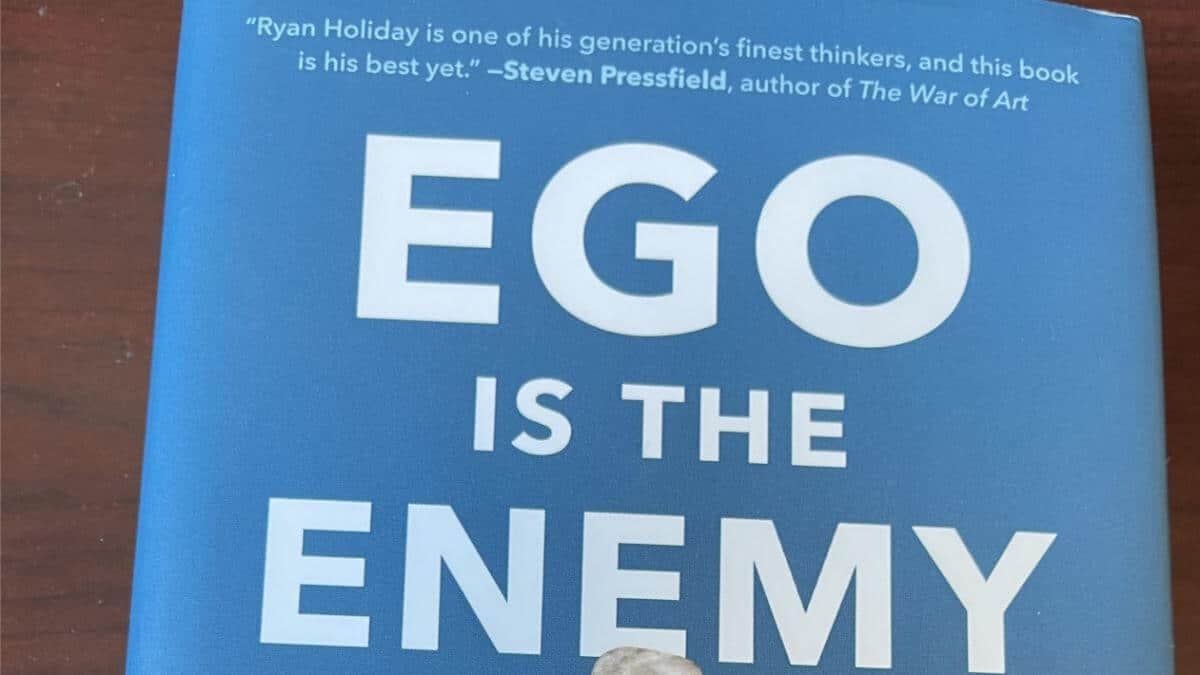
Home » Ego is the Enemy: A Book Review

I recently attended the Local Chamber of Commerce luncheon where Tony Vitello, the head coach of the University of Tennessee baseball team, was the featured speaker. Vitello is a highly successful coach who has been in his position at Tennessee since 2017. At UT, he has been selected as a two-time National Coach of the Year. His 2022 team was the SEC Champion while his 2021 and 2023 teams reached the College World Series in Omaha, Nebraska. Also, during the past six seasons, 35 former UT players have been selected in the MLB draft.
Coach Vitello provided an interesting insight into teamwork and the motivation and molding of individuals into a successful team. As in many sports, as young people grow, mature, and refine their skills, the number who enjoy success and advance up the ranks through college and on to the professional level is very small. Most of these athletes come from the high school ranks where their abilities made them the big man on campus and where their peers, in many cases, looked up to them and watched as, in some cases, their egos grew accordingly. Vitello expressed to the people in attendance that in the locker room and on the field, it was the teams that could work together and check their egos at the door that seemed to be the ones that enjoyed the most success. Camaraderie and support of each other, as well as learning to play and have fun together while respecting one another, are important parts of teamwork.
During his comments, Coach Vitello spoke about a book that was suggested to him. The book is titled, Ego Is the Enemy, by Ryan Holiday, which, in his opinion, was a good reference source that also provided insight into dealing with and understanding not only himself but his players and others alike.
As someone who enjoys reading and learning new things, following the luncheon I went online and ordered a copy of the book from Amazon. From start to finish it is a very easy read, filled with a ton of insight into the human ego. In the book, you will find many lessons to help you master success in life that many people with an insatiable ego find difficult to navigate. In today’s world where everyone wants instant success, the book helps us understand that real success comes from the journey and lessons learned along the long and winding road of life.
In life and in competition, we have all met or know someone who displays that obnoxious type of high ego whereby their self-promotion and declaration of superiority can be offensive to their peers and fellow competitors.
All of us who compete in our sport at any level or discipline have some form of ego in our desire to succeed and accomplish our goals.
Understanding our ego and learning how to control it takes time and insight. Ego Is the Enemy helps us to recognize certain life factors and put them in perspective.
The book is broken into three sections: Aspire, Success, and Failure. It is full of stories and anecdotes from people like Aristotle, Orson Welles, General George Marshall, President Ulysses S. Grant, Ralph Waldo Emerson, Ben Franklin, President Richard Nixon, Jackie Robinson, General and President Dwight D. Eisenhower, Ghengis Khan, and John Wooden, to mention a few.
Our ego can have a direct relationship to the success and failures in our lives, and the book’s three sections truly provide us with relatable insights and stories that can help us understand the journey. All three sections start with a quote related to the section.
Aspire: “To whatever you aspire, Ego is your enemy…”
The mini-chapters are titled: “Talk, Talk, Talk,” “To Be or to Do?” “Become a Student,” “Don’t Be Passionate,” “Follow the Canvas Strategy,” “Restrain Yourself,” “Get Out of Your Own Head,” “The Danger of Early Pride,” “Work, Work, Work,” and “For Everything that Comes Next, Ego Is the Enemy.”
Success: “To whatever success you have achieved, Ego is the enemy…”
Part two of the story is broken down into nine parts: “Always Stay a Student,” Don’t Tell Yourself a Story,” “What’s Important to You?” “Entitlement, Control, and Paranoia,” “Managing Yourself,” “Beware the Disease of Me,” “Meditate on the Immensity,” “Maintain Your Sobriety,” and “For What Often Comes Next, Ego Is the Enemy.”
Failure: “To whatever failure and challenges you will face, Ego is the Enemy…”
The final of the three principles is Failure and the seven sections are: “Alive Time or Dead Time?” “The Effort Is Enough,” “Fight Club Moments,” “Draw the Line,” “Maintain Your Own Scorecard,” “Always Love,” and “For Everything that Comes Next, Ego Is the Enemy.”
In the reviews section, The Honorable Frederic Block, a U.S. District Judge and author said, “What a valuable book for those in positions of authority! It has made me a better judge.”
Our history books tell us tales of visionaries who remade the world with tremendous and often irrational force. At the same time, we have also experienced those highly successful people who fought their egos daily, stayed out of the spotlight, and put their higher goals above themselves, their egos, and the great desire for recognition.
In my opinion, this book can provide each person who takes the time to read it with a new perspective on themselves and a better understanding of the many others they encounter in daily life. Understanding the human ego and how to manage and keep it under control is the basic and compelling nature of the book.
I also believe it is a book that showcases the importance of fairness and humility. We have all met boastful exhibitors and judges who express that, in their opinion, their dogs or their opinions are better and sought out more frequently than those of others.
Let’s face it, all of us as humans want to be respected by our peers as well as enjoy a level of success in our lifetime endeavors. At the same time, we need to be cognitive of how our behavior affects others.
Try to remember that EGO can be the enemy that keeps you from achieving those goals.
Understanding our ego and learning how to control it takes time and insight.
